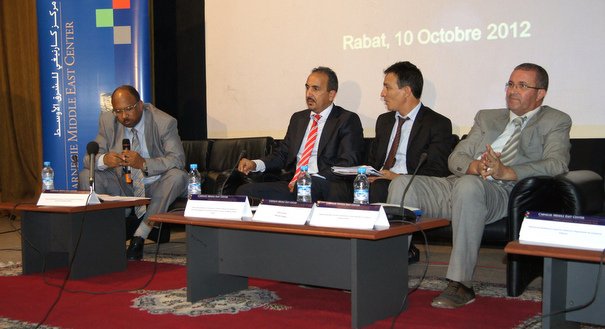Registration
Thank you!
You will receive an email confirming your registration.
Morocco’s foreign trade deficit has been worsening in recent years, with imports at twice the level of exports. Morocco’s trade deficit now accounts for 23 percent of GDP, a level unprecedented in the country’s recent history. Mohamed Benayad of the National Council for Foreign Trade, Ouljour Houssine from the Foreign Exchange Department, and Touhami Abdelkhalek of the National Institute of Statistics and Applied Economies joined Carnegie Middle East Center’s Lahcen Achy in Rabat to assess the deficit and outline policy options for the short and medium term.
Foreign Trade Deficit: A Worrying and Unsustainable Trend
- An Alarming Trend: Benayad, Ouljour, and Abdelkhalek agreed that the emerging trend in Morocco’s foreign trade is alarming. The gap between Morocco’s merchandise imports and exports is widening. Exports of services and transfers of money from Moroccans living abroad, which for years helped to reduce the trade deficit, are no longer sufficient, they said.
- Deteriorating Foreign Exchange Reserves: The current account had a deficit of eight percent of GDP in 2011 and is likely to further deteriorate by end of 2012. “Foreign exchange reserves are being depleted and their level can cover no more than four months of imports, compared to ten months five years ago,” Achy said. The current trend is no longer sustainable and exposes the country to real risks.
- International Implications: In August, the IMF opened a "precautionary" $6.2-billion line of credit to protect Morocco’s economy from further external shocks, Ouljour explained. More recently, Standard & Poor's downgraded Morocco's outlook to negative from stable, citing its economic vulnerability and increasing budget and current account deficits.
- External Shocks: Part of the growing trade deficit is due to factors that are beyond the government’s control, such as the price spikes of oil and food on the international markets and the bleak economic outlook in Europe, the key partner of Morocco, added Abdelkhalek.
Structural Deficit and Policy Failures
- Domestic Disadvantages: Most of the deficit is structural, resulting from the inability of Moroccan products to compete both domestically and on foreign markets, Abdelkhalek explained. The country has been lagging behind in its industrialization process, with modest product and export diversification, Benayad argued. He added, “Morocco opened its economy through its commitments under the WTO and in the free trade agreements with Europe, the United States, and Turkey. Yet, the country was ill-equipped, with poor productivity and unskilled labor.”
- Global Competition: With the rise of China in international trade, many countries have been driven out of labor-intensive sectors because of their uncompetitive wages, said Achy. Yet some countries have managed to maintain export growth by producing more sophisticated products that use higher technology and skilled labor.
Morocco has not done this, due its poor human capital and modest investment in research and development.
- Exchange Rates: A steady appreciation of the real effective exchange anchored to the Euro has exacerbated Morocco’s competitive position, Achy explained. Meanwhile, many of the countries that compete with Morocco have seen real depreciations of their respective currencies.
- The Role of the Moroccan Government: The government recently designed policies to support manufacturing and promote exports, said Benayad. Most policies, however, are sectoral and uncoordinated. The government needs a comprehensive vision and consistent package of policies to manage short term constraints and lay the foundation for a more ambitious development agenda.
